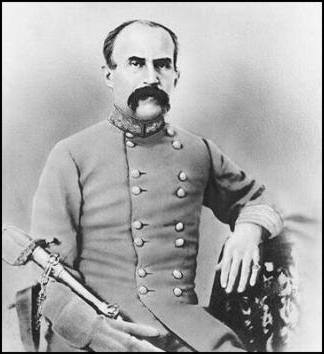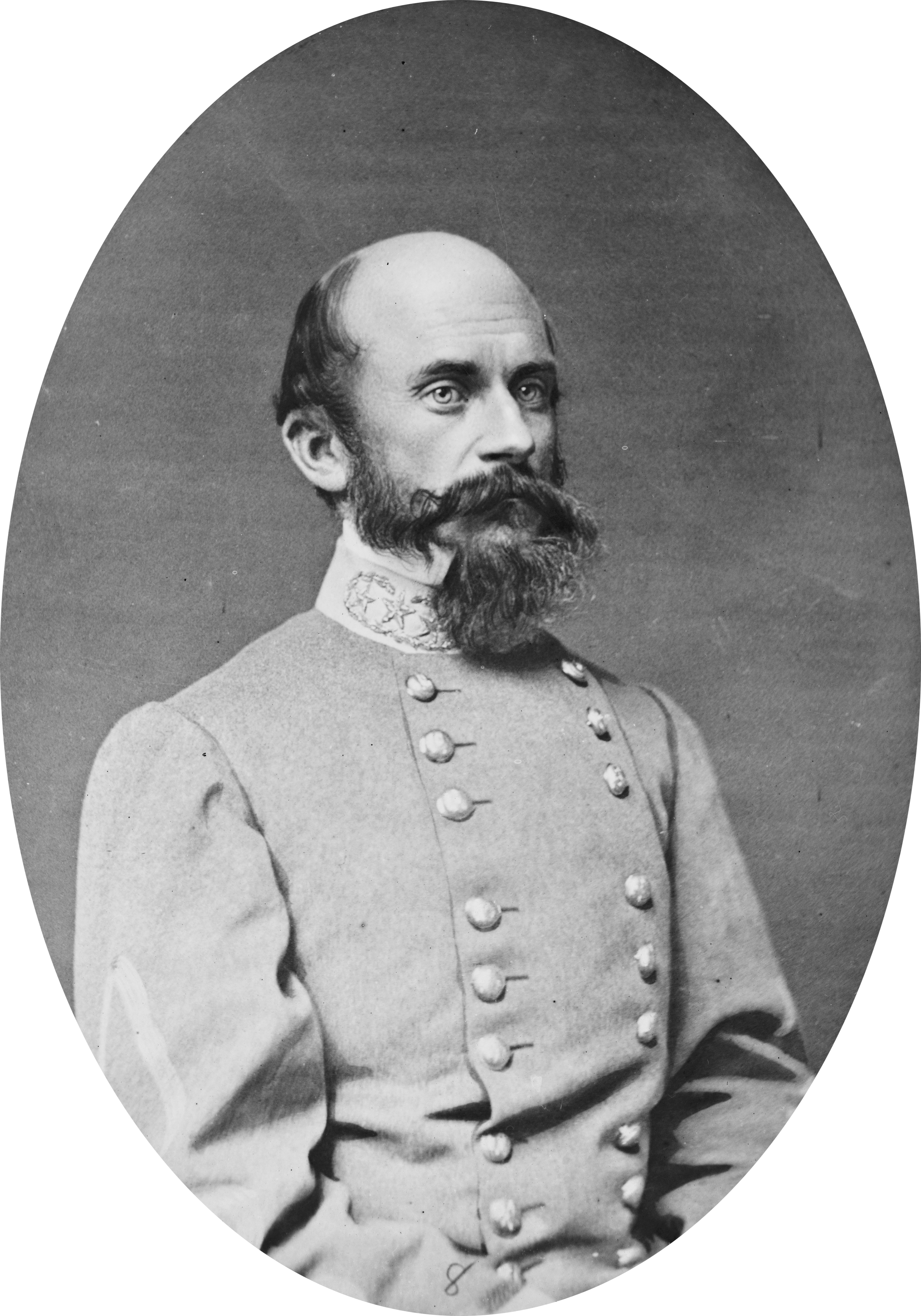A digression triggered by "Risk Avoidance and other Eggistential Consequences"
If you read the "About me" page, you know that I'm retired. I may not be all that astute, but I couldn't help but notice I'd become older than most of my colleagues. Not just that, but the baton of authority was getting passed to some of those I used to manage. That was a really big hint. I knew that if I wanted want to try something different, time had come to be alert for the next junction on the trail.
Perhaps that is why I'm drawn to the episode between Issac Trimble and Richard Ewell at Gettysburg.
 |
| Major General Issac Trimble (1802-1888) One oldest Rebel officers and was known for his lack of tact... |
Trimble graduated from Graduate of West Point in 1822. He was 17th of 42. Only one other of his classmates joined the Confederacy. He had served in the US Army for 10 years before retiring in 1832. He eventually moved to Maryland and was the construction engineer for several railroad lines. By the time the War started, he was Superintendent of several east coast railroads. No doubt he was accustomed to exercising his will over his younger subordinates.
Trimble joined the Confederate Army in May of 1861. Later that summer, he was promoted to Brigadier General. The following summer, he campaigned with Stonewall Jackson as part of Ewell's Division. During this period, Trimble and Ewell must have become well acquainted. Both men served with distinction.2 In August, during the 2nd battle of Bull Run, both Trimble and Ewell were seriously wounded. Ewell lost a leg. Trimble would be incapacitated for nine months.
 |
| Lieutenant General Richard Ewell (1817-1872) |
He joined the Confederate Army in 1861 a few weeks after the attack on Fort Sumter. Nine months later Stonewall Jackson appointed Ewell division commander and promoted him to Major General. He performed well under Jackson until he was wounded at 2nd Bull Run.
Ewell's recuperation took nine months. He returned to duty under Jackson in May '63. When Jackson died of wounds received at Chancellorsville, Lee promoted Ewell to Lieutenant General with command the 2nd Corps.4 Until this point, Ewell had proved his ability carry out orders, but he'd never exercised independent field command.
Meanwhile, Trimble had been promoted to Major General in January 1863. However, he was also slow to recover and his division was assigned to another Major General.5. In June, Trimble felt he was fit for duty and, despite the lack of orders, rode to join Lee as he marched towards Gettysburg.
Within days of arriving, Trimble's famous lack of tact caused a disruption in Lee's headquarters. Lee had crossed the Potomac; distractions could not be tolerated. Lee promptly ordered Trimble to join Ewell, his old commander, as "supernumerary," i.e. an officer without a command or any official role. He arrived in Ewell's camp on June 30th. The Battle of Gettysburg would start 2 days later. On the first day of the battle, he roamed the battlefield free to form his own ideas of how the battle should be fought. When he saw the heights south of town were unoccupied, Trimble galloped to Ewell so that Lieutenant General would immediately issue the order to advance. (see my the "Ewell at Gettysburg" section of the previous post). But Trimble's advice was ignored and Ewell missed his historical moment.
Surely Trimble must have fixed on that moment. It must have been clear as the day is long that Lee might have won he battle if only Ewell had pursued the obvious course. Why did the leadership select an unproven man like Ewell for independent command? Why not officers with more experience who would listen and lead?
Trimble would have known the difference between effective and ineffective leadership. He was 15 years Ewell's senior. He had managed the building of railroads. He was accustomed to exercising independent judgment. He was a leader in his own right. How frustrating it must have been to see history turn on a decision Trimble knew, with certainty, to be wrong.
In the end, it was better for the country that Ewell's judgment failed him, but when I read about the Trimble/Ewell incident, I reminded of shockingly poor decisions made by younger colleagues who had obtained positions of authority. In the heat of schedule and deadline pressure, there little more frustrating than a decision based on inexperience, faulty reasoning and flawed judgment. Even now I wince when I think of the wasted development funds. That's why avoidable, costly errors like the one made by Ewell are evocative.
Of course, we learn by mistakes. I certainly made decisions that caused dismay among my elders. Each new generation must make its own mistakes, and each passing generation must feel the pinch of avoidable misfortune due to lost wisdom. Are do they?
The NASA workforce is aging; a generational change is underway. The generation that developed Voyager, Mariner, Galileo and Cassini are retiring. But before heading out the door, they established a library of mandatory rules, practices, processes and guidelines that were intended to avoid the mistakes of the past. There are now hundreds of volumes and thousands of pages of requirements for spacecraft developers.
While the development of these documents was well intentioned, the result is a text book case of unintended consequences. Here's a few that come to mind:
- The volumes of rules mandate a lot of unnecessary work. Developers are now overwhelmed with process minutia. An effective manager needs to be a "process lawyer" in order to protect a team from distractions.
- A compliance industry has evolved to ensure process compliance.
- Technical authority was passed from those who do the technical work to those who are expert in the rules and oversee compliance.
- Rule compliance now consumes a significant part of every development budget
- The next generation is being trained in a culture of compliance that has encoded current practice and stymies innovation.
This yoke of compliance does more harm that good. Rules cannot replace the complex analysis and decision process that works best when experience informs intuition. Imagine if the army had established rules for Ewell that would have prevented his lapse of judgment by replacing judgment with written procedure? Does anyone think that would be a better way to run a command? Is there a more likely recipe for disaster?
When taken to the logical extreme, we're faced with the horns of a dilemma. On one hand we are destined to repeat the errors of the previous generation. On the other, we're destined to sacrifice creativity and innovation to rigid compliance.
Clearly prudence is needed. Currently the scale is tipped toward rigidity. That seems natural given the Agency's aging workforce. What's alarming is that many of the next generation have embraced the culture of compliance. I say, "let the next generation make mistakes, even costly ones," so long as those are not the mistakes of compliance. That is the path for genuine progress.
Denoument
Two days after the exchange between Trimble and Ewell, Trimble commanded a division in Pickett's charge. Trimble was seriously wounded. Since he was too weak to travel back across the Potomac with Lee, Trimble was left to Gettysburg and tended to by a Union family. When he recovered, Trimble was transferred to a union prison for the rest of the war.
Ewell continued to commanded the 2nd Corps until the following May at the Battle of Spotsylvania where Ewell had a famous encounter with Lee. The battle was going badly for the Confederates. Lee happened upon Ewell when corps commander had lost control of his troops and was shouting profanities to restore order. Lee rode up to Ewell and famously said, "How can you expect to control these men when you have lost control of yourself."
Shortly after, Ewell fell from his horse and became too incapacitated to command the 2nd Corps. He was then relieved of his command and ordered to arrange the defenses around Richmond. That is where he served out the war.
1. There were several older Confederate generals including David Emanuel Twiggs (71), William Smith (67) Samuel Cooper(66). These men were a hardy lot.
2. However, Stonewall was to disparage Trimble as "I do not regard him as a good disciplinarian.' It should be noted that Jackson was fanatical about both discipline and religion.
3. His classmates included William T. Sherman and George Thomas; both played significant roles in the Union victories in the western campaigns. Eight of Ewell's other classmates served in the Confederate army, but none were prominent.
4. The hierarchy high command derives from the Cromwell's "New Model Army" which was organized during the English Civil Wars. A 'Captain-General' held the top spot. The second rank was called 'Lieutenant-General." The third rank was called 'Sargent-Major General.' Over the years sergeant was dropped and the rank was simply called 'Major General.' Hence a Lieutenant General out ranks a Major General.
5. Major General Allegheny Johnson.

No comments:
Post a Comment